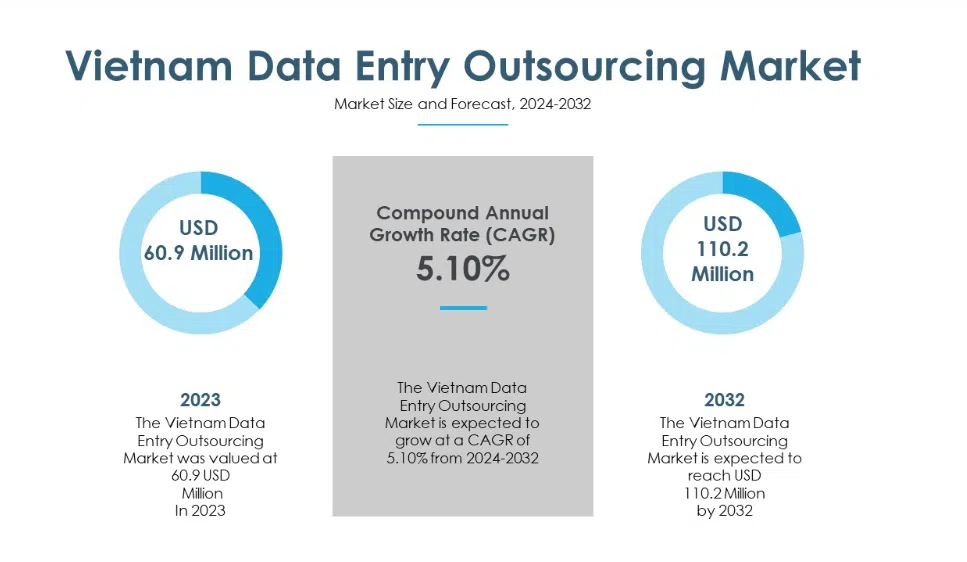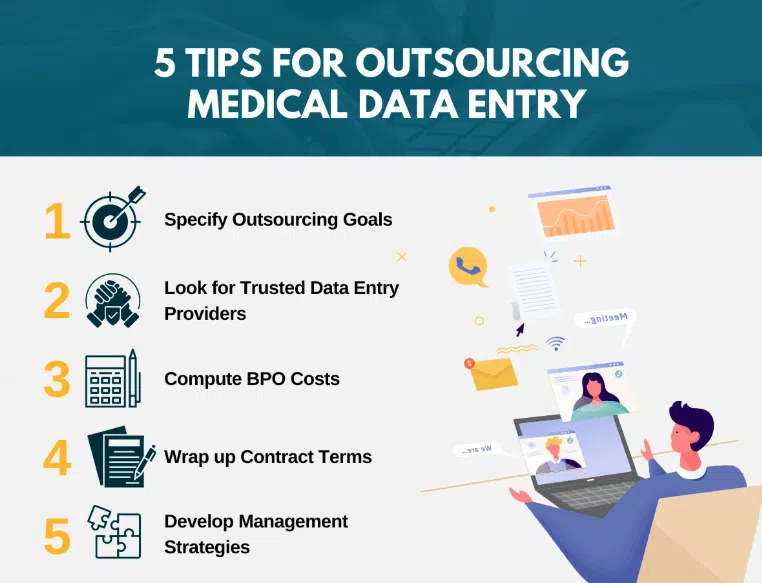Maximizing Efficiency with Data Entry Outsourcing: Key Benefits and Strategies
In today’s fast-paced business environment, where accuracy and efficiency are paramount, data entry outsourcing has emerged as a strategic solution for many organizations. This approach involves delegating data entry tasks to external experts, allowing businesses to streamline their operations and focus on core activities.
In Vietnam, Data Entry Outsourcing Services Market was valued at US$ 60.9 million in 2023 and is anticipated to reach US$ 110.2 million by the end of 2032 with a CAGR of 5.10% from 2023 to 2032.

Image source: Cognizance Market Research
For companies considering this services, partnering with specialized providers for data entry or an prominent software development company can be transformative. The outsourcing companies can demonstrate how leveraging external expertise can enhance operational efficiency and drive better results.
Understanding Data Entry Outsourcing
Data entry outsourcing is a process where companies delegate data management tasks to external service providers who specialize in efficient and accurate data processing. This strategic move allows organizations to handle large volumes of data more effectively while concentrating on their core functions.
Data entry outsourcing encompasses a wide range of tasks, from entering data into databases to processing transactions and maintaining records. By partnering with skilled data entry service providers, businesses can ensure that their data management processes are handled with precision, leading to improved operational efficiency.
Key Benefits of Data Entry Outsourcing
Data entry outsourcing offers numerous advantages that can significantly impact a company’s operational efficiency and overall performance. As organizations seek to enhance their data management practices, the benefits of outsourcing become increasingly evident. Here are some of the key benefits:

Image source: eDatamine
1. Cost Reduction
One of the primary advantages of data entry outsourcing is cost reduction. By outsourcing data entry tasks, businesses can avoid the expenses associated with hiring, training, and managing an in-house data entry team. Outsourcing providers often operate in regions with lower labor costs, which translates to financial savings for companies. For instance, according to a report by Deloitte, companies can achieve cost savings of up to 60% by outsourcing data entry tasks compared to maintaining an in-house team.
Data entry outsourcing allows organizations to allocate their resources more effectively, focusing on core business functions while external experts handle data-related tasks. This cost-effective approach not only reduces operational expenses but also enables businesses to invest in other areas of growth and development.
2. Enhanced Accuracy and Quality
Accuracy and quality are crucial aspects of data management, and outsourcing providers excel in delivering high standards in these areas. Specialized data entry service providers employ advanced technologies and rigorous quality control measures to ensure that data is entered correctly and consistently. These providers often have well-established processes for verifying and validating data, minimizing errors and discrepancies.
Get in touch with Savvycom for a free consultation. We’ll help you decide on next steps, explain how the development process is organized, and provide you with a free project estimate.
3. Increased Efficiency and Productivity
Data entry outsourcing contributes to increased efficiency and productivity within an organization. By offloading data management tasks to external experts, businesses can streamline their operations and allow their internal teams to focus on higher-value activities. This shift in focus not only accelerates data processing but also boosts overall productivity.

Image source: OA
Outsourcing providers are equipped with specialized tools and technologies that enhance data processing speed and accuracy. As a result, businesses experience faster turnaround times for data entry tasks, leading to improved operational efficiency and quicker decision-making.
4. Scalability and Flexibility
Scalability and flexibility are key advantages of data entry outsourcing. Outsourcing partners can adapt their services to meet the fluctuating needs of a business, whether during peak seasons or project expansions. This scalability ensures that companies can handle varying data volumes without compromising service quality.
For instance, a retail company that experienced seasonal spikes in data entry requirements benefited from outsourcing. The outsourcing provider was able to scale its services up or down based on the company’s needs, ensuring that data processing remained efficient and accurate throughout peak periods.
5. Access to Advanced Technologies
Outsourcing data entry tasks provides businesses with access to advanced technologies that may not be available in-house. Data entry service providers often utilize cutting-edge software and systems to enhance data processing efficiency. By partnering with these providers, businesses can benefit from technological advancements without the need for substantial capital investment.
e-Commerce company, specifically, that outsourced its data entry tasks gained access to advanced data capture technologies and automated processing systems. These technologies improved the accuracy and speed of data entry, leading to more efficient order processing and inventory management.
Have a Project Idea in Mind?
Get in touch with Savvycom’s experts for a free consultation. We’ll help you decide on next steps, explain how the development process is organized, and provide you with a free project estimate.
Best Practices for Data Entry Outsourcing
To maximize the benefits of data entry outsourcing, businesses should adhere to best practices that ensure a successful partnership with outsourcing providers. Implementing these strategies helps businesses achieve optimal results and align outsourcing efforts with organizational goals.
1. Choose the Right Provider
Selecting the right data entry outsourcing provider is crucial for achieving desired outcomes. Businesses should evaluate potential partners based on their expertise, track record, and ability to meet specific data management needs. It is essential to choose a provider with a proven history of delivering high-quality data entry services.
For instance, Savvycom, a leading software development company, is known for its reliable outsourcing solutions, including data services. Evaluating providers based on their experience and reputation ensures that businesses receive high-quality services tailored to their requirements.
2. Define Clear Objectives and Expectations
Defining clear objectives and expectations is essential for a successful outsourcing arrangement. Businesses should communicate their data entry requirements, quality standards, and deadlines to the outsourcing provider. Establishing clear guidelines helps ensure that the outsourced tasks meet the company’s needs and expectations.
Healthcare organizations that outsourced their data entry tasks provided detailed instructions and performance metrics to the outsourcing provider. This clarity helped align the provider’s efforts with the organization’s goals, resulting in improved data accuracy and timely processing.

Image source: unity communications
3. Implement Robust Quality Control Measures
Robust quality control measures are critical for maintaining high standards in data entry. Businesses should work with their outsourcing provider to establish comprehensive quality control processes, including regular audits and performance evaluations. These measures help ensure that data entry tasks are completed accurately and efficiently.
A case study involving a legal firm that outsourced its data entry tasks highlighted the importance of quality control. The firm implemented regular quality checks and performance reviews with the outsourcing provider, resulting in a significant reduction in data errors and improved overall service quality.
Looking For a Trusted Tech Partner?
We’ll help you decide on next steps, explain how the development process is organized, and provide you with a free project estimate.
4. Foster Effective Communication and Collaboration
Effective communication and collaboration between the business and the outsourcing provider are key to a successful partnership. Regular updates, feedback, and collaborative problem-solving contribute to a smooth workflow and address any issues promptly. Effective communication ensures that both parties are aligned and working towards common goals.
5. Monitor Performance and Evaluate Results
Monitoring performance and evaluating results are important for optimizing data entry outsourcing. Businesses should track key performance indicators (KPIs) to assess the effectiveness of the outsourcing arrangement and identify areas for improvement. Regular performance reviews help ensure that the outsourcing partnership continues to meet the company’s needs and deliver desired outcomes.
For instance, an education institution that outsourced its data entry tasks regularly reviewed performance metrics and conducted evaluations with the provider. This ongoing assessment allowed the institution to make data-driven decisions and optimize the outsourcing arrangement for better results.
Frequently Asked Questions (FAQs)
How can data entry outsourcing benefit my business?
Data entry outsourcing offers several benefits, including cost reduction, enhanced accuracy, increased efficiency, scalability, and access to advanced technologies. By outsourcing data entry tasks, businesses can achieve greater operational efficiency and cost savings.
What factors should I consider when choosing a data entry outsourcing provider?
When selecting a data entry outsourcing provider, consider factors such as their expertise, experience, quality control measures, and track record. Choosing a provider that aligns with your specific data management needs and business objectives is essential for a successful partnership.
How can I ensure the quality of outsourced data entry tasks?
To ensure quality, define clear objectives and expectations, implement robust quality control measures, and maintain effective communication with the outsourcing provider. Regular audits and performance reviews help monitor and improve the quality of data entry tasks.
Can data entry outsourcing be scaled based on business needs?
Yes, data entry outsourcing offers scalability and flexibility. Outsourcing providers can adjust their services to accommodate changes in data processing demands, such as seasonal fluctuations or project expansions, ensuring that businesses can manage varying data volumes efficiently.
Conclusion
Data entry outsourcing is more than just a cost-saving measure—it is a transformative approach to enhancing operational efficiency and scalability. By embracing strategies that prioritize data quality assurance and implementing secure data encryption, businesses can mitigate risks and ensure the accuracy and reliability of their information. Furthermore, outsourcing providers often excel in managing the stages of data processing, enabling companies to process, analyze, and utilize information more effectively.
In today’s fast-paced digital landscape, leveraging a data analytics platform can unlock valuable insights, addressing challenges such as big data risk while capitalizing on emerging data analytics trends. When paired with real-time data processing, these solutions allow businesses to stay ahead of the curve and make informed decisions swiftly.
At Savvycom, we understand the challenges and difficulties of managing and entering data. Having collaborated with numerous clients, we deliver secure, cost-effective data solutions by integrating your business model, compliance needs, and technology options into a unified strategy.

Whether it’s ensuring top-notch data quality, employing cutting-edge encryption, or leveraging advanced analytics tools, Savvycom is your trusted partner in transforming data into a strategic advantage.


